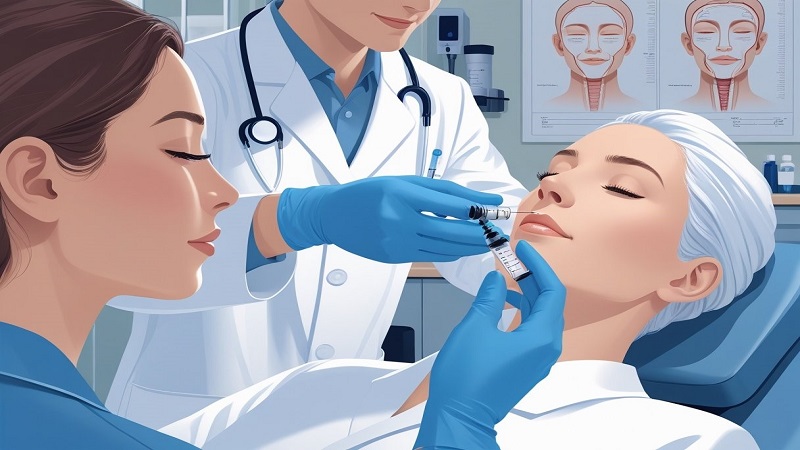Facial aesthetic treatments like Botox and fillers have become increasingly popular options for those looking to refresh their appearance without surgery. These minimally invasive procedures can reduce wrinkles, restore volume, and enhance facial contours when administered properly.
Choosing qualified, experienced medical providers is the single most important factor in ensuring safe and effective Botox and filler treatments. Practitioners should have specific training in facial anatomy and injection techniques to minimize risks and deliver natural-looking results.
Understanding what to expect before, during, and after treatment helps patients make informed decisions about these cosmetic procedures. From realistic outcome expectations to potential side effects, being well-informed allows individuals to approach these treatments with confidence rather than uncertainty.
Understanding Safe and Effective Botox & Fillers
Cosmetic injectables have revolutionized aesthetic medicine by offering minimally invasive solutions for facial rejuvenation. These treatments provide patients with options that require little to no downtime while delivering noticeable results.
What Are Botox and Dermal Fillers?
Botox is a purified protein derived from Clostridium botulinum bacteria. The active ingredient, botulinum toxin type A, is a prescription medication used in small, controlled doses for both cosmetic and therapeutic purposes. It’s been FDA-approved for cosmetic use since 2002.
Dermal fillers, on the other hand, are gel-like substances injected beneath the skin. The most common type contains hyaluronic acid, a naturally occurring substance in the body that helps maintain skin hydration and volume. Other filler varieties may contain calcium hydroxylapatite, poly-L-lactic acid, or polymethylmethacrylate (PMMA).
Both treatments are administered through injections but serve different purposes in facial rejuvenation. While Botox addresses dynamic wrinkles caused by muscle movement, fillers restore volume and fill static wrinkles that are present at rest.
How Botox and Fillers Work
Botox Mechanism: Botulinum toxin works by temporarily blocking nerve signals to muscles. When injected, it prevents the release of acetylcholine, a neurotransmitter responsible for muscle contractions. This relaxes the targeted facial muscles, reducing the appearance of dynamic wrinkles like crow’s feet, forehead lines, and frown lines.
The effects typically develop within 3-7 days and last 3-4 months before gradually wearing off as the body metabolizes the protein.
Filler Mechanism: Injectable fillers work differently by physically filling space beneath the skin. Hyaluronic acid fillers attract water molecules, creating volume and hydration in the treated area. This effectively “fills in” wrinkles, folds, and areas of volume loss.
Different fillers have varying longevity, ranging from 6-18 months for hyaluronic acid products to 2+ years for more permanent options.
Key Indications and Cosmetic Applications
Botox excels at treating:
- Forehead lines and horizontal creases
- Glabellar lines (frown lines between eyebrows)
- Crow’s feet around the eyes
- Bunny lines on the nose
Beyond cosmetic uses, Botox has therapeutic applications for blepharospasm, cervical dystonia, chronic migraines, and hyperhidrosis (excessive sweating). It can also help manage bruxism (teeth grinding) by relaxing jaw muscles.
Dermal fillers are ideal for:
- Adding volume to lips
- Softening nasolabial folds (smile lines)
- Restoring cheek volume
- Filling tear troughs under eyes
- Rejuvenating hands
Both treatments can be used complementarily to achieve a more youthful appearance. When administered by qualified medical professionals, these procedures offer safe and effective results with minimal downtime.
Best Practices for Safety and Optimal Results
Achieving safe and satisfactory outcomes with botox and fillers depends on several critical factors including provider selection, proper techniques, and understanding potential risks. Following established protocols maximizes benefits while minimizing complications.
Choosing Qualified Providers and Consultation
Provider selection is the foundation of successful cosmetic procedures. Always choose board-certified plastic surgeons, dermatologists, or practitioners with specialized training in facial anatomy and injection techniques. These professionals possess the expertise to deliver optimal results safely.
During consultation, a qualified provider will review your medical history, including allergies, medications, and previous treatments. They should discuss realistic expectations and potential outcomes based on your facial structure.
Ask to see before-and-after photos of their previous work. Reputable providers will be transparent about their qualifications and experience with specific products like Botox, Dysport, Restylane, or Juvéderm.
Red flags include significantly discounted prices, procedures offered in non-clinical settings, or providers who seem dismissive of your questions and concerns.
Injection Techniques and Procedure Safety
Proper injection technique is crucial for both safety and results. Experienced practitioners will:
- Cleanse the treatment area thoroughly
- Mark injection points precisely based on facial anatomy
- Use appropriate needle sizes for different products and treatment areas
- Inject at the correct depth and angle
- Apply the right amount of product
Cold compresses may be applied before injection to reduce pain and minimize bruising. Some providers use topical anesthetics for sensitive areas.
Practitioners should follow strict sterile techniques, including using new needles for each patient and proper hand hygiene. They should also document the specific products used, including lot numbers and expiration dates.
After treatment, providers typically recommend avoiding exercise, alcohol, and blood-thinning medications for 24 hours to minimize bruising.
Understanding Risks, Side Effects, and Complications
Common side effects of botulinum toxin injections and fillers include:
|
Common Side Effects |
Serious Complications (Rare) |
|
Bruising |
Tissue necrosis |
|
Swelling |
Vision problems |
|
Redness |
Severe allergic reactions |
|
Tenderness |
Infection |
|
Headache |
Vascular occlusion |
Most side effects are mild and resolve within days. Bruising can be minimized by avoiding blood thinners before treatment. Swelling typically subsides within 48 hours.
Serious complications are rare but require immediate medical attention. These include signs of botulism (difficulty breathing, muscle weakness), severe pain, or significant asymmetry.
Certain individuals should avoid these treatments, including pregnant or breastfeeding women and those with neurological disorders or specific allergies.
Popular Brands and Complementary Treatments
Different brands serve specific purposes and areas:
Neurotoxins:
- Botox – Most established brand, typically lasts 3-4 months
- Dysport – Often spreads more, useful for larger areas
- Xeomin – Contains fewer additives, potential alternative for those with Botox resistance
Fillers:
- Juvéderm – Hyaluronic acid filler for lips and facial folds
- Restylane – Effective for under-eye hollows and fine lines
- Radiesse (calcium hydroxylapatite) – Provides structural support for deeper wrinkles
Complementary treatments can enhance results. Microdermabrasion or chemical peels before injections may improve product absorption and overall skin appearance. Combining different types of fillers with botulinum toxin often provides more comprehensive rejuvenation.
Maintenance treatments scheduled at appropriate intervals help preserve results. Most neurotoxins require treatment every 3-4 months, while fillers may last 6-18 months depending on the product and location.



